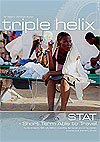Adverse maternal outcomes from IVF
UK maternal mortality has been creeping up for two decades. The first published case report (1991) related to in vitro fertilisation predicted increasing maternal morbidity and mortality associated with assisted reproductive technologies, due to pregnancies at an older age, multiple pregnancies and pre-eclampsia. A 2010 Dutch study showed that overall maternal mortality in IVF pregnancies was higher than in the general Netherlands population. BMJ editorial authors reviewing this and other data call for systematic reporting so lessons can be learnt and action taken.
(BMJ 2011;342:d436 doi: 10.1136/bmj.d436)
French Senate rejects assisted suicide & euthanasia
On 25/26 January the French Senate rejected proposals to legalise assisted suicide and euthanasia, by 170 votes to 142. Francois Fillon, the French prime minister, had spoken out strongly against the proposals. This relatively clear rejection in a very secular state should encourage us in the UK that we have the arguments, and that when they are heard we will continue to reject all such unnecessary and unethical proposals.
(Le Figaro 26 January 2011)
Silent night
Before Christmas, a BMJ article began with a hospital notice: 'Noise disturbs sick people. Quietness assists recovery.' Palliative care consultant Paul Keeley continued: 'I spent some of my otherwise misspent youth in the great Benedictine monasteries of England. There I learnt of the great silence that falls across such monasteries from the last office that completes the day until after dawn, when the monks raise their voices in praise and thanks... Is it too fanciful to believe that, to facilitate the healing of patients, such a great silence may be allowed to fall across hospital wards?'
(BMJ 2010;341:c6989)
10 best & worst developments for the family in 2010
The US-based World Congress of Families released its 'awards' in January. Although very much North America oriented, CMF was pleased to claim some credit for best developments 6 and 8: 'UK plans to block children's access to Internet porn' and 'Regarding abortion, Europe preserves right of conscience for medical professionals'; and sorry to agree with worst development 9: 'Growing anti-Christian bigotry in Europe'.
(World Congress of Families Newsletter, January 2011 Vol 5:1, p3.)
'The ways we say goodbye'
UK funeral customs are changing. Over half of today's funerals are celebrations of life, and a Co-operative Funeralcare report explains: 'High profile funerals, such as that of Princess Diana and, more recently, of Jade Goody, have encouraged people to adopt a fresh approach…Religious music is declining with contemporary music, from love songs to favourite TV programme themes increasing in popularity.' The most popular songs are My Way, Wind Beneath My Wings, and Time To Say Goodbye. (Co-operative funeralcare news,24 January 2011.
Satisfied with the NHS?
At the end of the first decade of the new millennium, there are lots of surveys out. According to the 2009 British Social Attitudes survey, satisfaction with the NHS is at an all time high. When New Labour came to power in 1997, only 34% were satisfied; by 2009 64% were. The greatest increases were among those with traditionally low levels – 18-34 year olds and better-off households. Satisfaction with GPs was at 80%, and with outpatients at 67%.
(Quoted in Quadrant, January 2011: 2)
What British people believe
In late 2010 Populus polled 1,037 British adults. Only 19% accept the biblical account that God created the earth in six days and rested the seventh; 55% thought it was untrue and 25% were undecided. 67% think humans have evolved from apes. Only 37% believe in life after death; 26% refute the possibility of an afterlife and 37% are unclear. 31% think UFOs have visited the earth from other planets, though 31% think not and 38% are unsure. In all of these findings, Christian Research report encouragingly on the large proportions who are undecided.
(Quoted in Quadrant, November 2010: 4)
What British evangelicals believe: 1. Abortion
21st Century Evangelicals is a new Evangelical Alliance and Christian Research publication. Throughout 2010 over 17,000 questionnaires were completed at festivals popular among evangelical Christians all over the UK, and at 35 randomly selected EA member churches. To the statement 'Abortion can never be justified', 20% agreed a lot, 17% a little, 18% were unsure, 28% disagreed a little, and 17% disagreed a lot. Younger evangelicals were more likely to think abortion could never be justified.
(21st Century Evangelicals: 8. www.eauk.org/snapshot/read.cfm)
What British evangelicals believe: 2. Assisted suicide
To the statement 'Assisted suicide is always wrong', 42% agreed a lot, 18% a little, 24% were unsure, 10% disagreed a little, and 6% disagreed a lot. CMF clearly has a lot of work to do in engaging with the churches, explaining the Sixth Commandment and providing an evidence base. Assisted suicide is merely euthanasia one step back (and therefore prohibited by the Commandment), is unethical, and is always unnecessary.
(21st Century Evangelicals: 9. www.eauk.org/snapshot/read.cfm)
What British evangelicals believe: 3. Homosexuality
Because most evangelicals distinguish between homosexual 'feelings' and 'actions', two questions were asked. Regarding 'It is wrong to have homosexual feelings', 13% agreed a lot, 11% a little, 21% were unsure, 25% disagreed a little, and 30% disagreed a lot. When considering 'Homosexual actions are always wrong', 59% agreed a lot, 14% a little, 11% were unsure, 8% disagreed a little, and 8% disagreed a lot.
(21st Century Evangelicals: 9. www.eauk.org/snapshot/read.cfm)































